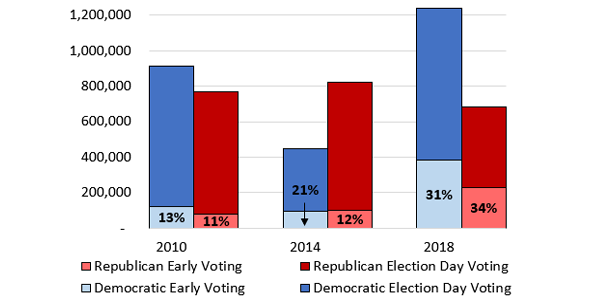It’s time once again for the post-mortem. Following every election cycle the analysis of the data is an Olympian event. Some of the opinions are gold medal worthy, a lot of the rest are, for the sake of those pontificating, luckily forgotten.
The only constant from one election cycle to the next is that political consultants, many of them shady to say the least, profit handsomely win or lose.
At Illinois Family Action, our look at the results of the March 20th primary has only begun. There will be more analysis and commentary to follow in the coming days.
At the top of the Republican ticket, Jeanne Ives’ loss to Bruce Rauner has both positives and negatives for the GOP and the conservative agenda.
To start off our look at what happened, here are a few basic numbers (with some emphasis added):
Turnout: 1.92 million people voted … the highest for a gubernatorial primary election since 2002, according to the Illinois Campaign for Political Reform (that’s the year Rod Blagojevich first ran as a clean government reformer in the wake of then Gov. George Ryan’s corruption investigation).
Dems: up 325,000 voters from 2010, which was the last most competitive year.
GOP: Down 138,000 voters from 2014, the last competitive primary.
Under this headline — “Democratic Turnout Surges, While GOP Turnout Drops in IL Primary” — here is Colin Williams reporting on some other numbers:
One likely reason for increased Democratic turnout was the number of high-profile contested races on the Democratic ballot. Along with the hard-fought gubernatorial and Attorney General races, voters were motivated by strong candidates for seats that haven’t seen serious challengers in years.
Regarding the drop in GOP turnout, Williams had this to say:
On the other hand, Republican turnout was depressed from 2014. Incumbent governors typically don’t see strong primary challengers when running for re-election, which can lead to a drop in Primary Election turnout for their party. This occurred on the Democratic side in 2014, when incumbent Pat Quinn had just one under-funded opponent. Although Governor Rauner played down the legitimacy of challenger Jeanne Ives’ candidacy for most of the primary, the closer-than-expected win by the governor underscores the engagement Ives drew from the GOP base.
Early voting played an increasingly important role in the election, as 32% of all voters cast a mail-in ballot or visited an in-person polling place before Election Day:
Early Voting turnout doubled this year compared to 2014, when only 16% of ballots were cast during the Early Voting period.
Spin, as always, was utilized by operatives on both the left and the right to explain the result. One right-of-center media personality, Dennis Byrne, had this to say in a post titled “Illinois Gov. Bruce Rauner is dead meat”:
In 30 years of writing op-ed columns for the Chicago Tribune and Chicago Sun-Times, I’m hard pressed to recall making any political predictions. I prefer to leave it to the Chicago Tribune’s Eric Zorn. But here comes an exception.
Bruce Rauner has slit his throat, with his general incompetence and a campaign that was so dishonest that it set some sort of record in a state where truth is typically flushable. The way he failed to get one of his goals accomplished in his three and a half years as governor is by itself a flop worthy of retiring him.
Byrne continues:
But after having skillfully muted social conservatives in his successful 2014 campaign by promising an entirely fiscal administration, he turned on them by signing on to his wife’s “progressive” social agenda. He now has placed the conservative Republican base in the unenviable position of voting for Rauner or not voting and handing over the governorship to the Democratic House Speaker Michael Madigan’s lickspittle J.B. Pritzker. It’s possible that just enough conservatives will stay home to completely return Illinois to the autocratic and destructive Democratic machine.
Some others I’ve spoken with post-election, agree with that assessment.
Byrne called Rauner’s election night speech a laughable attempt to unite Illinois Republicans. Byrne then quotes Rauner in his victory speech:
To those who of you around the state who wanted to send me a message [sic], let me be clear. I have traveled around the state and I have listened to you. While we differ on some things, let’s commit to working together on what unites us–the reforms we need to save our state.
Dennis Byrne doesn’t hold back:
Oh sure. What’s the first thing you’re going to do, Mr. Rauner, fire your wife, Diana? By many accounts, the self-proclaimed Democrat and progressive Diana had more to say about [what] you did than your revolving door staff. There’s no doubt in anyone’s mind that her influence (directives?) cleared the way for your approval of taxpayer funded elective abortions on demand (a rarity for any state), the helping hand you gave to illegal aliens, the deal that gave the union-controlled Chicago Public Schools everything they wanted “and more,” and other betrayals.
Byrne also touches upon “Rauner’s preposterous campaign ads that depicted his conservative Republican opponent Jeanne Ives as Madigan’s handmaiden.”
While more analysis is to follow here at IFA, my initial take-away is shock that the talented state Rep. Peter Breen is ready and willing to jump back on the Rauner bandwagon.
As a twenty-five-year observer of the Illinois political scene, I admit that I am disappointed to once again to see how some conservatives are ready to toss out their moral victory (almost taking the nomination away from Lyin’ Bruce).
Some conservatives are ready to repeat history — getting behind Rauner as they did in 2014 despite plenty of advice to the contrary — and risking yet another four years of Illinois Republican Party destruction at the hands of people like Bruce Rauner.
There is much more to follow.

